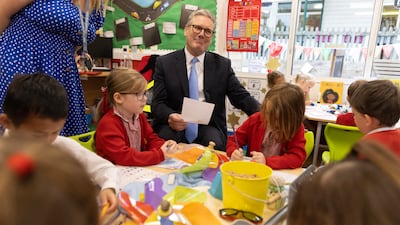There are many reasons why most countries don’t tax education, and the UK may be about to find out one of them.
Britain’s Labour government says it will impose VAT on private school fees from the beginning of next year, but a new report warns that the move could cost the UK treasury up to £1.8 billion ($2.4 billion). Many parents are expected to pull their children out of private schools once fees are hiked as a result of the new tax.
The Adam Smith Institute warned that one “unintended consequence” was that these parents may work less, and pay less tax, once they are not shelling out the £50,000 a year that top boarding schools cost. Other reports have suggested that most of the money the new tax may gather will have to be spent hiring new teachers for the state sector if the numbers leaving private schools run into the hundreds of thousands.
I am thousands of kilometres away in Malaysia, where my sons are educated, but I do feel personally about this issue.
I went to one of those institutions that Labour politicians are wont to decry as archaic bastions of privilege. I suppose the King’s School, Canterbury, nestled in the beautiful environs of the city’s cathedral, was archaic in one sense: it claims to have been founded in 597 AD. But were my fellow pupils in the 1980s all little Lord Snooties? Well, one was the daughter of one the 20th century’s greatest conductors, another is now the heir to a marquessate, a couple were the children of Tory cabinet ministers, and an old friend’s father was a bishop – which isn’t quite as grand as it sounds when you know what bishops were paid.
But most of us came from far less gilded backgrounds. I was there on a scholarship; my parents were teachers. Others were the offspring of accountants, country solicitors, farmers and small businessmen. One boy’s parents owned and ran a restaurant. Another’s father was in the police. It was hardly a playground for hereditary plutocrats, in other words.
We send our sons to private schools in Kuala Lumpur, and when it’s time to pay the fees, I look wistfully at the bank balance before and after I’ve signed the cheque. What holidays we could have had, what new car might we have bought, with the money. I imagine many readers may have had the same fleeting thought. But whether it’s in the Gulf, South-East Asia, Europe, or anywhere, lots of parents feel strongly that it’s more important to spend our hard-earned cash on the best education we can for our children.

We are clearly fortunate to be in a position to do so. But it is worth mentioning that this saves governments a huge amount of money – Aus$4.6 billion ($3 billion) a year in Australia alone, to take one example. And Australia is one of the many countries that acknowledges that, and recognises that it is important parents have choices, and therefore actually subsidises private schools. Denmark, New Zealand, five of Canada’s 10 provinces, and lots of other countries do the same.
Yes, in an ideal world, state schools – in whatever country – should be so superb that you would have to be mad to pay to go private. Some may remember an episode of the US TV series The West Wing when the character Sam Seaborn said: “Education is the silver bullet. Education is everything. Schools should be palaces.” I agree, and some countries have managed to achieve an enviable level of consistent excellence in their state education systems. Singapore, for instance. But it doesn’t seem to be easy, and the UK is an example of a wealthy country that hasn’t managed to do as well with its state sector as many parents would like – which is one reason why there is still a thriving market for private education.
But schools as “palaces”: that surely should be the aim, not penalising parents who make sacrifices to pay hefty fees.
As the Adam Smith Institute report shows, putting taxes on private schools may end up costing the state. There can also be other knock-on effects. The smaller schools that may have to shut because of the tax hike may well be a crucial part of the local economy, which will be affected by lost jobs, lost money spent locally, loss of demand for goods and services and so on. When the Greek government put 23 per cent VAT on independent schools in 2015, the state sector was overwhelmed, and such was the chaos, the move had to be reversed.
Forcing private schools to increase their fees still more – Eton College has already warned parents that theirs will rise to a hair-raising £63,000 per year – will paradoxically make them far more the preserve of the super-rich elite, since only they will be able to afford the fortunes required for their children to go to these schools.
That cannot be an outcome UK Prime Minister Keir Starmer is hoping for. Would he want that fate for the fee-paying Reigate Grammar School that he himself attended? I doubt it. Mr Starmer should think again, and reflect that many parents paying private school fees, whether in the UK or the rest of the world, are relatively ordinary people who just want the best for their children. They are not the enemy.


